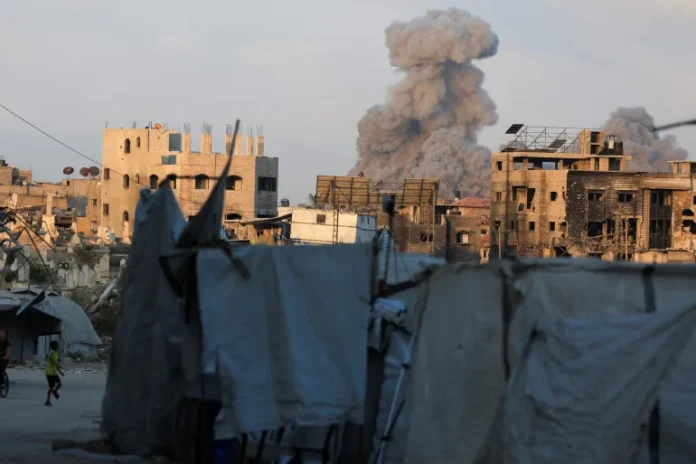Palestinians are fleeing several neighborhoods in Gaza City after the Israeli military began the first stages of a ground offensive, officials in the enclave said Thursday. The move comes after days of intense bombardment, artillery fire, and mounting fears of a full-scale assault on the densely populated city.
Israeli troops have established a foothold on Gaza City’s outskirts, a metropolis of more than one million people, as they press ahead with a strategy to seize what Prime Minister Benjamin Netanyahu has described as “the last terror strongholds” in Gaza.
The offensive has already displaced hundreds of families from the Zeitoun and Sabra districts, who sought refuge in the northwestern parts of the city despite nowhere being truly safe.
Residents described a night of relentless strikes. “The house shakes with us all night long — the sound of explosions, artillery, warplanes, ambulances, and cries for help is killing us,” Ahmad al-Shanti told AFP. Another displaced resident, Amal Abdel-Aal, said the skies “flash all night long” as air and artillery strikes continued without pause.
An Israeli military spokesman confirmed that troops were operating in Zeitoun and Jabalia to “lay the groundwork” for a broader offensive approved by Defence Minister Israel Katz earlier this week.
The plan is expected to be presented to Israel’s security cabinet in the coming days. Around 60,000 Israeli reservists are being called up in September to free active-duty soldiers for the campaign.
The looming escalation has drawn sharp criticism from the international community. UN Secretary General António Guterres renewed calls for an immediate ceasefire, warning that an assault on Gaza City would “inevitably cause death and destruction” on a massive scale.
3French President Emmanuel Macron echoed the concern, warning that Israel’s plan “can only lead to disaster for both peoples and risks plunging the entire region into a cycle of permanent war.”
Humanitarian organizations also voiced alarm. The International Committee of the Red Cross (ICRC) cautioned that the forced displacement of hundreds of thousands of civilians and intensified hostilities “risk worsening an already catastrophic situation” for Gaza’s 2.1 million residents, who are already struggling with shortages of food, medicine, and shelter.
Hamas, meanwhile, condemned Netanyahu’s stance, accusing him of waging a “brutal war against innocent civilians in Gaza City” and of disregarding a ceasefire proposal put forward by regional mediators. Israel has not formally responded to the plan, which included provisions for a temporary truce and the release of hostages.
According to the UN’s humanitarian office (OCHA), Israeli military evacuation orders and areas under operational control now cover 86 percent of Gaza. Maps released this week highlight Gaza City in the north, Khan Younis in the center, and Rafah in the south as key zones impacted by the campaign.
Despite widespread calls for restraint, Israel’s government has reiterated its intention to capture the entire Gaza Strip after ceasefire negotiations collapsed last month. For Gaza’s civilians, however, the latest developments have turned daily life into a struggle for survival, with the sound of war edging closer every hour.

